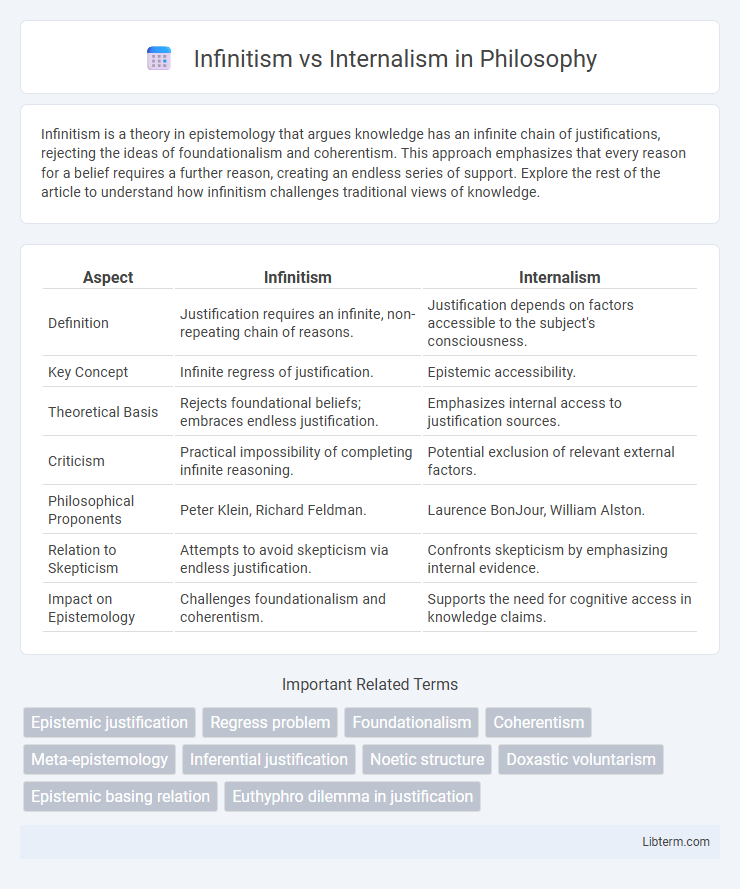Infinitism is a theory in epistemology that argues knowledge has an infinite chain of justifications, rejecting the ideas of foundationalism and coherentism. This approach emphasizes that every reason for a belief requires a further reason, creating an endless series of support. Explore the rest of the article to understand how infinitism challenges traditional views of knowledge.
Table of Comparison
| Aspect | Infinitism | Internalism |
|---|---|---|
| Definition | Justification requires an infinite, non-repeating chain of reasons. | Justification depends on factors accessible to the subject's consciousness. |
| Key Concept | Infinite regress of justification. | Epistemic accessibility. |
| Theoretical Basis | Rejects foundational beliefs; embraces endless justification. | Emphasizes internal access to justification sources. |
| Criticism | Practical impossibility of completing infinite reasoning. | Potential exclusion of relevant external factors. |
| Philosophical Proponents | Peter Klein, Richard Feldman. | Laurence BonJour, William Alston. |
| Relation to Skepticism | Attempts to avoid skepticism via endless justification. | Confronts skepticism by emphasizing internal evidence. |
| Impact on Epistemology | Challenges foundationalism and coherentism. | Supports the need for cognitive access in knowledge claims. |
Introduction to Infinitism and Internalism
Infinitism in epistemology asserts that justification for beliefs relies on an infinite, non-circular chain of reasons, rejecting foundational beliefs and coherentism. Internalism holds that justification depends solely on factors accessible to the thinker's internal cognitive perspective, emphasizing mental access to justifying reasons. Both theories address how knowledge is structured but diverge on whether justification requires potentially infinite reasoning or internally accessible evidence.
Defining Epistemic Infinitism
Epistemic Infinitism defines justification as an endless, non-repeating chain of reasons supporting a belief, rejecting the notion of foundational or self-justified beliefs. Unlike Internalism, which requires that all justificatory reasons be accessible to the believer's conscious awareness, Infinitism allows for an infinite regress of justifications that need not be fully apprehensible. This approach frames knowledge as a dynamic, unbounded structure of interconnected beliefs, emphasizing the necessity of continuous epistemic support rather than fixed foundations.
Understanding Epistemic Internalism
Epistemic internalism asserts that justification for a belief depends solely on factors internal to a subject's perspective, such as accessible mental states or evidence. Infinitism challenges this by arguing that justification requires an infinite chain of reasons, which remains accessible to the cognitive agent internally. Understanding epistemic internalism involves recognizing how knowledge is grounded in justifications that are self-reflectively accessible, contrasting with the infinitist demand for endless internal justificatory support.
Key Differences Between Infinitism and Internalism
Infinitism posits that justification requires an infinite, non-repeating chain of reasons, while Internalism asserts that justification depends solely on factors accessible to the thinker's conscious reflection. A key difference lies in the scope of justificatory evidence: Internalism demands mental access to justifiers, whereas Infinitism rejects the need for foundational beliefs or complete internal access. This divergence shapes debates on epistemic justification, with Infinitism emphasizing an endless justificatory process and Internalism focusing on cognitive accessibility and transparency.
Historical Context and Philosophical Roots
Infinitism and Internalism trace their philosophical roots to the epistemological debates of the 20th century, deeply engaging with foundational issues in justification and knowledge. Infinitism challenges traditional foundationalist and coherentist theories by positing that justification arises from an infinite, non-repeating chain of reasons, a view rooted in classical skepticism and modal logic. Internalism, emerging prominently through the works of philosophers like Roderick Chisholm and Laurence BonJour, emphasizes that justification depends solely on factors accessible to the subject's consciousness, reflecting a historical commitment to epistemic introspection and mentalist criteria.
Strengths of Infinitism in Epistemology
Infinitism in epistemology provides a compelling solution to the regress problem by positing an infinite, non-repeating chain of justifications, avoiding the pitfalls of circularity and foundationalism. This approach allows for continuous justification without requiring self-evident beliefs or arbitrary stopping points, strengthening the coherence of knowledge claims. Infinitism's strength lies in its capacity to embrace infinite justification sequences, which align with a dynamic and evolving understanding of knowledge rather than fixed epistemic foundations.
Strengths of Internalism in Justification
Internalism in epistemic justification emphasizes that justification depends solely on factors accessible to the subject's conscious reflection, enhancing the clarity and transparency of knowledge evaluation. This approach strengthens the agent's ability to provide justifications because the evidence for beliefs remains within their cognitive grasp, promoting epistemic responsibility and self-assessment. Internalism's focus on accessible justification conditions makes it robust against skepticism by requiring that the subject can articulate reasons, thereby ensuring epistemic accountability.
Major Criticisms of Infinitism
Infinitism faces major criticisms centered on its requirement for an infinite, non-repeating chain of justification, which many argue is practically and theoretically untenable. Critics claim that producing an endless sequence of reasons for beliefs is cognitively impossible and fails to provide the finite certainty sought in epistemic justification. Moreover, challenges arise from Internalism advocates who contend that justification must be internally accessible, a condition Infinitism struggles to fulfill given its reliance on infinite regress.
Critiques and Challenges for Internalism
Internalism faces significant critiques regarding its stringent requirement that justification must be accessible to the subject's conscious awareness, often leading to disputes over how one can have privileged access to all justificatory reasons. Critics argue that this accessibility condition is psychologically unrealistic and fails to account for the implicit or unconscious sources of justification influencing belief formation. Furthermore, internalism struggles to address the regress problem adequately because requiring that each justification be internally accessible can lead to an infinite chain of reasons, which infintism attempts to embrace rather than reject.
Infinitism vs Internalism: Contemporary Debates and Future Directions
Infinitism challenges Internalism by arguing that justification requires an infinite, non-repeating chain of reasons, contrasting Internalism's focus on accessible, finite evidence for belief justification. Contemporary debates center on the practical plausibility of infinitism in epistemic justification, questioning whether an infinite regress of reasons is cognitively achievable or necessary. Future directions explore hybrid models that integrate infinitist insights with internalist constraints, aiming to reconcile epistemic access with robust, non-finite justificatory structures.
Infinitism Infographic

 libterm.com
libterm.com